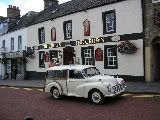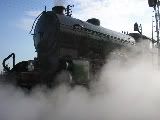Converting Vented Gas Cap to Non-Vented
Posted: 12 Oct 2010 04:20
Figured I'd post a write-up of this since I did it. Moss sells a locking gas cap that fits the later TR7s, but since it's for British cars it is vented. It was pretty easy to pull it apart and convert it to the US non-vented version, though.
There's one small external snap ring on the central shaft holding it together. Insert the key into the lock, remove the snap ring, and then pull out the lock tumbler. Disassembly beyond this is pretty straightforwards: just remember where everything goes.
In the big round metal piece under the plastic cap, there are three holes with various ball valves and springs in them. The valve components are held in place by a flat plastic washer that's just pressed in place around the central shaft. I just pried off the washer and removed as many of the valve components as I could. Then I filled the three holes from both sides with adhesive (I used JB Weld) and let it dry.
See red boxes in pic for locations. Reassembly is the reverse of assembly.
 [/url][url=http://www.flickr.com/photos/13048712@N07/5073713035/]
[/url][url=http://www.flickr.com/photos/13048712@N07/5073713035/]
-----
Tom
'79 TR7
'87 Alfa 75
'91 Alfa Spider
There's one small external snap ring on the central shaft holding it together. Insert the key into the lock, remove the snap ring, and then pull out the lock tumbler. Disassembly beyond this is pretty straightforwards: just remember where everything goes.
In the big round metal piece under the plastic cap, there are three holes with various ball valves and springs in them. The valve components are held in place by a flat plastic washer that's just pressed in place around the central shaft. I just pried off the washer and removed as many of the valve components as I could. Then I filled the three holes from both sides with adhesive (I used JB Weld) and let it dry.
See red boxes in pic for locations. Reassembly is the reverse of assembly.
 [/url][url=http://www.flickr.com/photos/13048712@N07/5073713035/]
[/url][url=http://www.flickr.com/photos/13048712@N07/5073713035/]
-----
Tom
'79 TR7
'87 Alfa 75
'91 Alfa Spider










